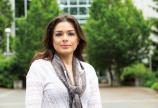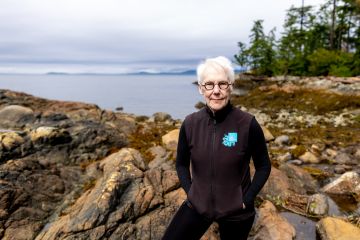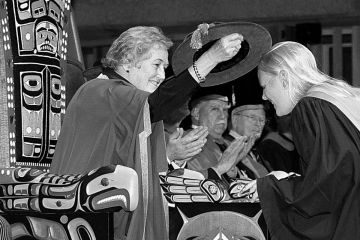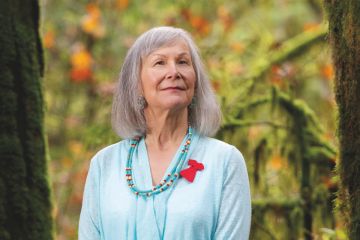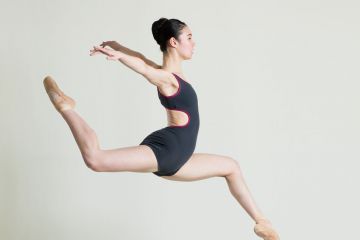Making space
- Anne Tolson
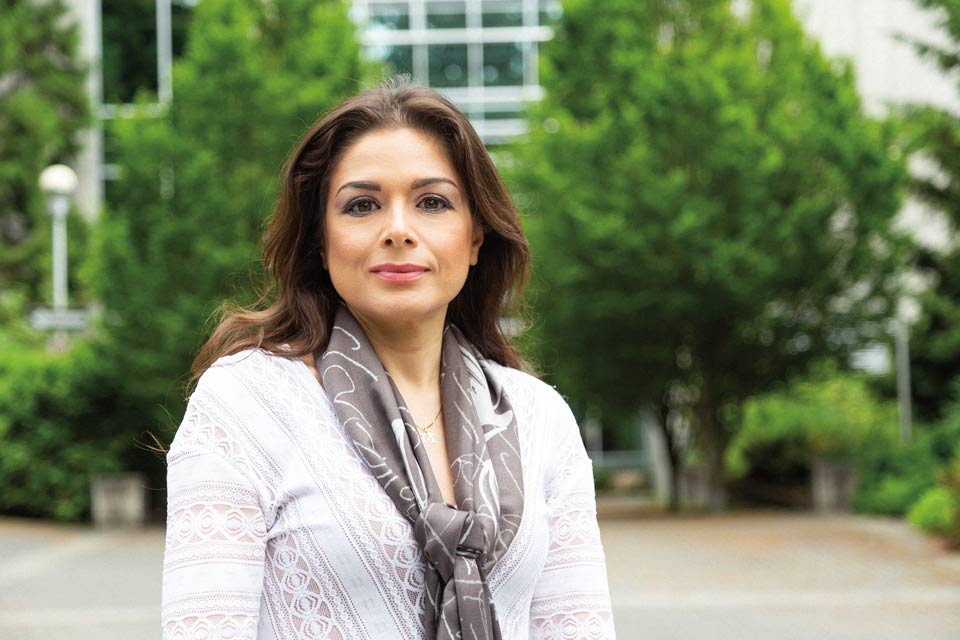
Mina Hoorfar failed the first year of her undergraduate degree in engineering. It wasn’t due to a lack of ability, drive or aptitude—she simply felt that she didn’t belong.
“My first year in engineering wasn’t easy—I was the only female student among a hundred young men and going to class was very scary,” recalls Hoorfar, UVic’s new dean of the Faculty of Engineering and Computer Science, whose undergrad years were spent at the University of Tehran. “I didn’t feel interested, engaged or included. So, I started missing classes, didn’t make any friends and, in my first year, I failed everything.”
The university handed Hoorfar an ultimatum: improve or leave.
Hoorfar decided to give engineering another chance. This time, however, she changed her approach. She took the time to develop a supportive and hard-working community of friends, who studied together and encouraged one another through the good days and the tough ones. Hoorfar worked diligently, discovered the innovative, solutions-oriented engineer within herself, and eventually graduated at the very top of her class. Yet she never forgot that early experience.
“In those early days, I always felt out of place and not as valuable as my peers,” says Hoorfar, who, on July 1, became the faculty’s first female dean. “I always thought that if I ever had the chance to change that type of environment, to make it more inclusive, I would do that.”
It’s no surprise, then, that one of Hoorfar’s top priorities at the fast-growing UVic faculty is championing equity, diversity and inclusion (EDI). She says that as a woman of colour in the traditionally male-dominated field of engineering, EDI principles are close to her heart. She notes that while post-secondary institutions have had some success in recent years in increasing the number of students and faculty members representing diverse groups in the field, much more can be done to ensure an ongoing sense of belonging.
We’re all spending so much energy on bringing in these amazing, intelligent people from under-represented groups, but once they join our programs, we tend to leave them alone. I don’t think we’re doing enough after they arrive to ensure they feel included and have the support they need.”
—Engineering and Computer Science Dean Mina Hoorfar
As dean, Hoorfar hopes to implement an effective mentorship program for new faculty members from under-represented groups. She also plans to work with students to find innovative ways to create a more inclusive community—in terms of gender, ethnicity, race, Indigeneity and ability.
Though she has plenty of ideas coming into her new role and describes herself as “a very passionate person who speaks from the heart,” Hoorfar recognizes the importance of seeking input before enacting changes. In the six months before she officially became dean, Hoorfar met online with numerous faculty members, staff, student groups, research groups and external organizations to learn as much as she could about UVic, the faculty and the larger community.
During these months, Hoorfar was also winding up fifteen successful years as a professor at the Okanagan campus of the University of British Columbia (UBCO). There, she earned a reputation as a top-notch researcher, teacher and academic leader, who brings a tremendous level of energy, passion and dedication to her work. While at UBCO, Hoorfar founded the 20-person Advanced Thermo-Fluidic Laboratory, where her work led to advancements in areas such as monitoring water quality to detect pathogens, enriching natural gas with hydrogen to reduce its carbon footprint and developing wearable sensors to track disease. She collaborated with top international research labs, won several prestigious awards and became president of the Canadian Society for Mechanical Engineering. During the six years before she joined UVic, Hoorfar led UBCO’s School of Engineering, which has more than 2,000 students and about 65 faculty.
Hoorfar says that throughout her education and career, she has always looked for fresh challenges and has never shied away from the long hours they required.
She left Iran in 1998 to pursue her Master’s and PhD at the University of Toronto. Her father, who had previously visisted Canada, recommended the country as a place where people are evaluated on their accomplishments, not their gender or where they came from. Today, her parents and sister live in Toronto, while her brother remains in Iran.
In 2006, Hoorfar chose to teach and research at UBC Okanagan over the much larger, well-established Vancouver campus because she loved the prospect of working with the community to build up a new engineering school. She was looking for another challenge when she accepted the position at UVic, where about 3,600 undergraduate and graduate students are educated, 100 faculty members research and teach—and 60 staff support them.
“I’m someone who needs to be on a learning curve and I was looking for other ways to contribute,” she says. “And as dean, I knew I could really implement my vision.”
There will be many opportunities to learn and contribute at UVic Engineering and Computer Science, where student enrolment has been growing steadily for many years, largely because of the pressing needs of the tech sector. In 2018, in recognition of this demand, the provincial government provided funding for 500 additional undergraduate degree spaces in the faculty.
This past July, to accommodate the increasing numbers of students enrolling in engineering and computer science, as well as the high-impact work of the faculty’s researchers, the Province of BC announced it would provide $64.8 million toward the construction of two new state-of-the-art facilities. The remaining $24.8 million of the project’s total $89.6-million cost will be covered by UVic, through direct funding and a fundraising campaign.
Hoorfar is excited to take on the challenges that come with the faculty’s growth. Still, in the same way that she found an effective strategy to thrive during her early undergraduate years, Hoorfar is shifting how she approaches her new job.
If you’d asked me a year ago, I would have said that all I do is work, work, work. A dean who works 24-7 will get things done, but she may be very limited in terms of vision and scope. You want a well-rounded person, who knows about politics, who exercises, talks to people and has a social life.”
—Engineering and Computer Science Dean Mina Hoorfar
Hoorfar says living on her own the past few months has provided the opportunity to explore everything from hot yoga and hiking to meals out and music (she loves ’70s and ’80s tunes). Her son will move here from Kelowna next year when he finishes Grade 8.
“The moment I got off the ferry, I started this new chapter in my life,” says Hoorfar. “I’ve made the choice to be a multi-dimensional person, I’m enjoying things and my life now has different colours.
“But I’m evolving as well. I still have a lot to learn and do to make myself a better person, and that’s why I started this journey.”T
Photos
In this story
Keywords: leadership, administration, diversity, research
People: Mina Hoorfar
Publication: The Torch

